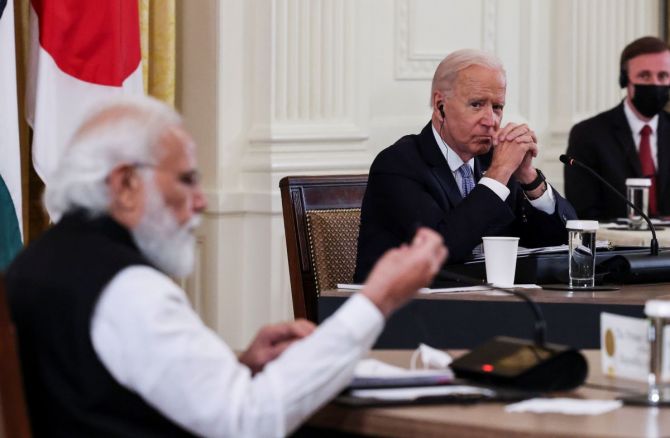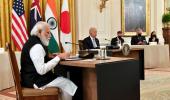United States President Joe Biden has reiterated America's support for India's permanent membership on a reformed United Nations Security Council and its entry into the Nuclear Suppliers Group during his first in-person bilateral meeting with Prime Minister Narendra Modi at the White House.

President Biden, in his talks with Prime Minister Modi, applauded India's 'strong leadership' during its United Nations Security Council Presidency in August 2021, according to the US-India Joint Leaders' Statement issued after their meeting in the White House on Friday.
'In this context, President Biden also reiterated US support for India's permanent membership on a reformed UN Security Council and for other countries who are important champions of multilateral cooperation and aspire to permanent seats on the UN Security Council,' it said.
President Biden's support provides a big boost to New Delhi's push for the reform of the powerful UN organ as India has been at the forefront of efforts at the United Nations to push for an urgent long-pending reform of the Security Council, emphasising that it rightly deserves a place at the UN high table as a permanent member.
India in June asserted that the Inter-Governmental Negotiations (IGN) on UN Security Council reforms can no longer be used as a smokescreen, as the General Assembly decided to roll over the IGN work to the next UNGA session and agreed to include an amendment proposed by the G4 nations of Brazil, Germany, India and Japan.
At present, the UNSC comprises five permanent members and 10 non-permanent member countries which are elected for a two-year term by the General Assembly of the United Nations.
The five permanent members are Russia, the United Kingdom, China, France and the United States and these countries can veto any substantive resolution.
There has been growing demand to increase the number of permanent members to reflect the contemporary global reality.
During his meeting with Prime Minister Modi, President Biden also reaffirmed US support for India's entry to the Nuclear Suppliers Group (NSG), the joint statement said.
The NSG is a 48-member grouping which regulates global nuclear commerce.
Ever since India applied for the membership of the NSG in May 2016, China has been insisting that only those countries which have signed the Non-Proliferation Treaty (NPT) should be allowed to enter the organisation.
India and Pakistan are not signatories of the NPT. After India's application, Pakistan too has applied for the NSG membership in 2016.
China maintains that there would be no discussion on India's entry into the NSG before reaching a specific plan on non-NPT members' participation in the elite grouping, as it declined to give a timeline to reach a consensus among member states on this issue.
President Biden's support to India's permanent seat in the UNSC assumes significance as last month, State Department Spokesperson Ned Price told reporters at his daily news conference that the US values 'working with India at the United Nations, including in the context this month of the Security Council'.
Responding to a question on whether the Biden administration thinks that India should be a permanent member of the UN Security Council, Price said that the US supports building a consensus for a 'modest' expansion of the Council for both permanent and non-permanent members, provided it does not diminish its effectiveness or its efficacy and does not alter or expand the veto.
"We believe that a reformed Security Council that is representative, that is effective, and that is relevant is in the best interest of the United States and all of the UN member states," Price had said.
In their talks on Friday, Prime Minister Modi and President Biden also welcomed the extension of the Statement of Guiding Principles on Triangular Cooperation for Global Development to leverage the combined capacities of India and the US to address global development challenges around the world, particularly in the Indo-Pacific and Africa, the statement said.
They renewed their close relationship and charted a new course to advance the partnership between the world's largest democracies They also affirmed a clear vision that will guide the US-India relationship forward, the statement added.
*****
US reaffirms 'unwavering commitment' to India as Major Defence Partner
US President Joe Biden has reaffirmed his 'unwavering commitment' to India as a Major Defence Partner through close engagements, including information sharing and strengthening cooperation in advanced military technologies.
During the first-ever in person bilateral meeting between President Biden and Prime Minister Narendra Modi at the White House on Friday, they also welcomed the deepening of advanced industrial cooperation and noted the recent project to co-develop air-launched unmanned aerial vehicles under the Defence Technology and Trade Initiative, and encouraged more such joint efforts.
'President Biden reaffirmed the strength of the defence relationship between the United States and India and the unwavering commitment to India as a major defence partner through close defence engagements in information sharing, sharing of logistics and military-to-military interactions, strengthening cooperation in advanced military technologies, and expanding engagements in a multilateral framework including with regional partners,' said a joint statement issued after the bilateral meeting.
In 2016, the United States designated India as a Major Defence Partner.
Commensurate with this designation, in 2018, India was elevated to Strategic Trade Authorisation tier 1 status, which allows India to receive license-free access to a wide range of military and dual-use technologies regulated by the Department of Commerce.
The leaders called upon the government and private stakeholders to use the existing ecosystems of innovation and entrepreneurship in defence industries for co-development, co-production and expanding mutual defence trade.
'They also looked forward to the inaugural meeting of the Industrial Security Agreement summit to facilitate high-end defence industrial collaboration,' the statement said.
The leaders decided that the US and India must continue and expand their partnership in new domains and many areas of critical and emerging technology -- space, cyber, health security, semiconductors, AI, 5G, 6G and future generation telecommunications technology, and Blockchain, that will define innovation processes, and the economic and security landscape of the next century.
They recognised the foundational need to address vulnerabilities and threats in cyberspace, including to promote critical infrastructure resilience, and welcomed the increasing partnerships among governments to counter ransomware and other cyber-enabled crime, including efforts to combat cybercriminals that operate from within their borders.
Biden and Modi reiterated the importance of sustainable capacity-building and noted that mutual technical assistance efforts to respond to cyber threats should be prioritised and increased, including through dialogues, joint meetings, training and sharing of best practices.
'They looked forward to the finalisation of a Space Situational Awareness Memorandum of Understanding that will help in sharing of data and services towards ensuring the long-term sustainability of outer space activities by the end of the year,' the statement said.
As global partners, the US and India resolved to further strengthen their collaboration in education, science and technology and people-to-people engagement.
The leaders welcomed close consultations through the 2+2 Ministerial Dialogue of the Foreign and Defence Ministers of India and the US to be held later this year, it said.











 © 2025
© 2025